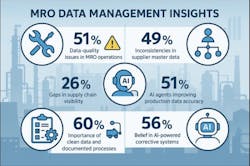Survey: Data quality issues costing manufacturers billions
What you'll learn:
- Over half of manufacturing organizations surveyed faced MRO data quality issues.
- Poor data can lead to machine downtime and heightened inefficiences.
- The costs that result from low data quality are in the billions across manufacturing sectors.
AI intelligence automation company Verdantis found that more than half of manufacturing organizations face significant MRO data quality issues that lead to operational inefficiencies, ultimately resulting in billions of dollars wasted due to machine downtime.
Verdantis found that roughly 51% of manufacturing organizations faced significant MRO data quality issues over an 18-month study of almost 1,900 leaders in mining, oil and energy, utilities, manufacturing, and other production-intensive sectors.
The costs that result from poor data quality are in the billions, the survey emphasized.
“Manufacturing's most expensive blind spot lies in maintenance operations, where 50.8% of respondents report experiencing between 25% and 50% downtime due to poor data quality, with another significant portion reporting even higher impacts,” according to an Oct. 6 release from Verdantis about the survey results, which were published this month.
In the context of manufacturing downtime costs, that translates to $2.3 million per hour in automative and $125,000 per hour across industrial businesses, according to the release.
That blind spot remains consistent in manufacturing, despite the billions that are spent annually on enterprise resource planning software.
Data quality issues persist even though 56% of manufacturer respondents adopted AI, as 49% of respondents still struggle with supplier data inconsistencies.
Verdantis called this an AI “effectiveness gap,” in which advanced technologies are not successful in driving manufacturing improvements because they are deployed on compromised data foundations.
Episode 2 of (R)Evolutionizing Manufacturing: Data is everything
The survey also found that 26% of manufacturing organizations lack basic supply chain integration, a capability that modern ERP systems promise to deliver. This “visibility gap,” Verdantis found, “directly impacts manufacturing efficiency and contributes to significant downtime and cost overruns, particularly in MRO and production processes.”
Manufacturers without integrated supply chain data therefore face increased vulnerabilities within the operational environment, especially regarding machine downtime that results from these MRO data quality issues.
“This suggests that artificial intelligence deployment without addressing underlying data governance creates what experts term ‘AI on quicksand,’” the release continues.
For example, when using AI-driven predictive systems with data that can inform when and how a machine is going to fail, inaccurate data can cause increased machine downtime.
Without quality data, AI cannot accurately predict when a machine might need a maintenance cycle. If predictive maintenance isn’t accurate, machine failure is more likely, resulting in increased machine downtime.
Overall, if the quality of MRO data is low, the AI mechanisms used in manufacturing operations won’t be effective. This leads to increased costs for operators and manufacturers associated with machine failure and downtime.
Verdantis identified six main phases of manufacturing data evolution from the pre-industrial era to present day.
Manufacturing data management evolved from handwritten ledgers and steam-powered machinery to the assembly line, then to information systems to integrated data management, then finally to real-time sensors and the use of AI.
However, one thing that has remained consistent is that all of these systems are only as effective as the data and information that power them.
Verdantis suggested several potential ways to mitigate data quality issues, some of which companies are already deploying. Cost savings opportunities include reducing duplicate data silos and manual integration work while minimizing downstream quality issues and compliance penalties.
Revenue generation potential comes from enhanced customer analytics and improved cross-selling capabilities, along with faster decision-making and innovation enabled by democratized access to trusted data.
Immediate actions for manufacturers require comprehensive data auditing, master data governance implementation and cross-functional alignment between IT, operations and business leaders, while strategic investments should focus on data quality automation, real-time monitoring systems and AI-powered management to scale governance capabilities.
The company emphasized that this isn’t a technology problem, it’s a data strategy problem.
“The Verdantis study exposes a fundamental truth: the gap between ERP investment and operational reality represents both the greatest challenge and largest opportunity facing manufacturing today,” the release reads.
“Manufacturing organizations that bridge the gap through comprehensive data governance will not only solve their billion-dollar efficiency problems but gain sustainable competitive advantages in an increasingly data-driven economy.”
About the Author
Sarah Mattalian
Staff Writer
Sarah Mattalian is a Chicago-based journalist writing for Smart Industry and Automation World, two brands of Endeavor Business Media, covering industry trends and manufacturing technology. In 2025, she graduated with a master's degree in journalism from Northwestern University's Medill School of Journalism, specializing in health, environment and science reporting. She does freelance work as well, covering public health and the environment in Chicagoland and in the Midwest. Her work has appeared in Inside Climate News, Inside Washington Publishers, NBC4 in Washington, D.C., The Durango Herald and North Jersey Daily News. She has a translation certificate in Spanish.


